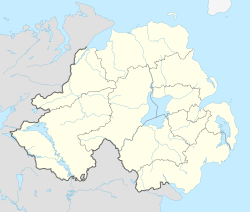| RAF Ballyhalbert RNAS Ballyhalbert (HMS Corncrake) | |||||||||||
|---|---|---|---|---|---|---|---|---|---|---|---|
| Ballyhalbert, County Down in Northern Ireland | |||||||||||
 Squadron photo taken on RAF Ballyhalbert in 1945 Squadron photo taken on RAF Ballyhalbert in 1945 | |||||||||||
  | |||||||||||
| Coordinates | 54°29′50″N 5°28′14″W / 54.49722°N 5.47056°W / 54.49722; -5.47056 | ||||||||||
| Type | Royal Air Force sector station | ||||||||||
| Code | YB | ||||||||||
| Site information | |||||||||||
| Owner | Air Ministry Admiralty | ||||||||||
| Operator | Royal Air Force Royal Navy | ||||||||||
| Controlled by | RAF Fighter Command 1941-45 * No. 13 Group RAF * No. 82 Group RAF Fleet Air Arm 1945-46 | ||||||||||
| Site history | |||||||||||
| Built | 1940 (1940) | ||||||||||
| In use | June 1941 – 1946 (1946) | ||||||||||
| Battles/wars | European theatre of World War II | ||||||||||
| Airfield information | |||||||||||
| Elevation | 8 metres (26 ft) AMSL | ||||||||||
| |||||||||||
Royal Air Force Ballyhalbert or more simply RAF Ballyhalbert is a former Royal Air Force sector station at Ballyhalbert on the Ards Peninsula, County Down, Northern Ireland.
RAF Kirkistown was a satellite to the larger Ballyhalbert.
Construction began in 1940.
History
Royal Air Force use
It opened provisionally in May 1941, prior to completion of the works, as a RAF Fighter Command base where the primary weapon was the Supermarine Spitfire, and officially on 28 June of that same year. The base provided local protection from Luftwaffe raids on Belfast and the rest of the province. Other aircraft operated from the base were the Hawker Hurricane, Bristol Beaufighter, North American Mustang and Boulton Paul Defiant night fighter. During its lifetime, Ballyhalbert was home to RAF, Women's Auxiliary Air Force (WAAF), British Army, Royal Navy and United States Army Air Forces (USAAF) personnel. Servicemen from Australia, New Zealand, Canada and Poland also saw duty at Ballyhalbert.
- Squadrons
- No. 25 Squadron RAF
- No. 26 Squadron RAF
- No. 63 Squadron RAF
- No. 125 Squadron RAF
- No. 130 Squadron RAF
- No. 153 Squadron RAF
- No. 245 Squadron RAF
- No. 256 Squadron RAF
- No. 303 Squadron RAF
- No. 315 Polish Fighter Squadron
- No. 501 Squadron RAF
- No. 504 Squadron RAF
- Units
- Detachment of No. 13 Group Anti-Aircraft Co-operation Flight RAF (May – August 1941)
- No. 82 Group Communication Flight RAF (September 1941 – January 1942)
- No. 82 Group Training Flight RAF became No. 1493 (Target Towing) Flight RAF (October 1941 – January 1942 & January – April 1943)
- No. 1402 (Meteorological) Flight RAF (December 1944 – August 1945)
- No. 1480 (Anti-Aircraft Co-operation) Flight RAF (November – December 1941)
- No. 1494 (Target Towing) Flight RAF (April 1943 – March 1945)
- No. 2707 Squadron RAF Regiment
Fleet Air Arm use
In 1942, a request for lodger facilities and a Royal Naval Air Section at RAF Ballyhalbert was granted by RAF Northern Ireland. On 14 July 1945 the airbase was transferred by RAF Northern Ireland on loan to the Admiralty and known as Royal Naval Air Station Ballyhalbert (RNAS Ballyhalbert). On 17 July it was commissioned as HMS Corncrake with Captain G.N.P. Stringer as commanding officer.
As HMS Corncrake the airfield was used by the Fleet Air Arm for squadrons working up for carrier duty. On 13 November 1945 the airfield was closed and placed on Care and Maintenance. By 1947, with no further use made of the site it was abandoned. The airfield was sold to developers in March 1960, and is in use for several popular caravan parks.
- Fleet Air Arm units
- 3rd Naval Fighter Wing
- 718 Naval Air Squadron
- 725 Naval Air Squadron
- 768 Naval Air Squadron
- 784 Naval Air Squadron
- 787 Naval Air Squadron
- 800 Naval Air Squadron
- 808 Naval Air Squadron
- 812 Naval Air Squadron
- 827 Naval Air Squadron
- 880 Naval Air Squadron
- 882 Naval Air Squadron
- 885 Naval Air Squadron
- 887 Naval Air Squadron
- 894 Naval Air Squadron
- 899 Naval Air Squadron
- 1840 Naval Air Squadron
- 1846 Naval Air Squadron
See also
References
Citations
- ^ Falconer 2012, p. 40.
- ^ "RAF Ballyhalbert". Ballyhalbert website. Archived from the original on 5 October 2009. Retrieved 25 February 2009.
- ^ Jefford 1988, p. 33.
- Jefford 1988, p. 45.
- Jefford 1988, p. 58.
- Jefford 1988, p. 59.
- Jefford 1988, p. 63.
- Jefford 1988, p. 77.
- Jefford 1988, p. 79.
- Jefford 1988, p. 85.
- Jefford 1988, p. 86.
- Jefford 1988, p. 94.
- Jefford 1988, p. 95.
- Sturtivant, Hamlin & Halley 1997, p. 179.
- Sturtivant, Hamlin & Halley 1997, p. 184.
- ^ "Ballyhalbert". Airfields of Britain Conservation Trust. Retrieved 11 February 2013.
- ^ Sturtivant, Hamlin & Halley 1997, p. 136.
- Sturtivant, Hamlin & Halley 1997, p. 129.
- Sturtivant, Hamlin & Halley 1997, p. 134.
- "R.N.A.S. Ballyhalbert". Royal Navy Research Archive - Fleet Air Arm Bases 1939 - present day. Retrieved 29 October 2023.
- Sturtivant & Ballance 1994.
Bibliography
- Falconer, J (2012). RAF Airfields of World War 2. UK: Ian Allan Publishing. ISBN 978-1-85780-349-5.
- Jefford, C G (1988). RAF Squadrons. A comprehensive record of the movement and equipment of all RAF squadrons and their antecedents since 1912. Shrewsbury: Airlife. ISBN 1-85310-053-6.
- Sturtivant, R; Ballance, T (1994). The Squadrons of The Fleet Air Arm. Tonbridge, Kent, UK: Air-Britain (Historians) Ltd. ISBN 0-85130-223-8.
- Sturtivant, R; Hamlin, J; Halley, J (1997). Royal Air Force flying training and support units. UK: Air-Britain (Historians). ISBN 0-85130-252-1.